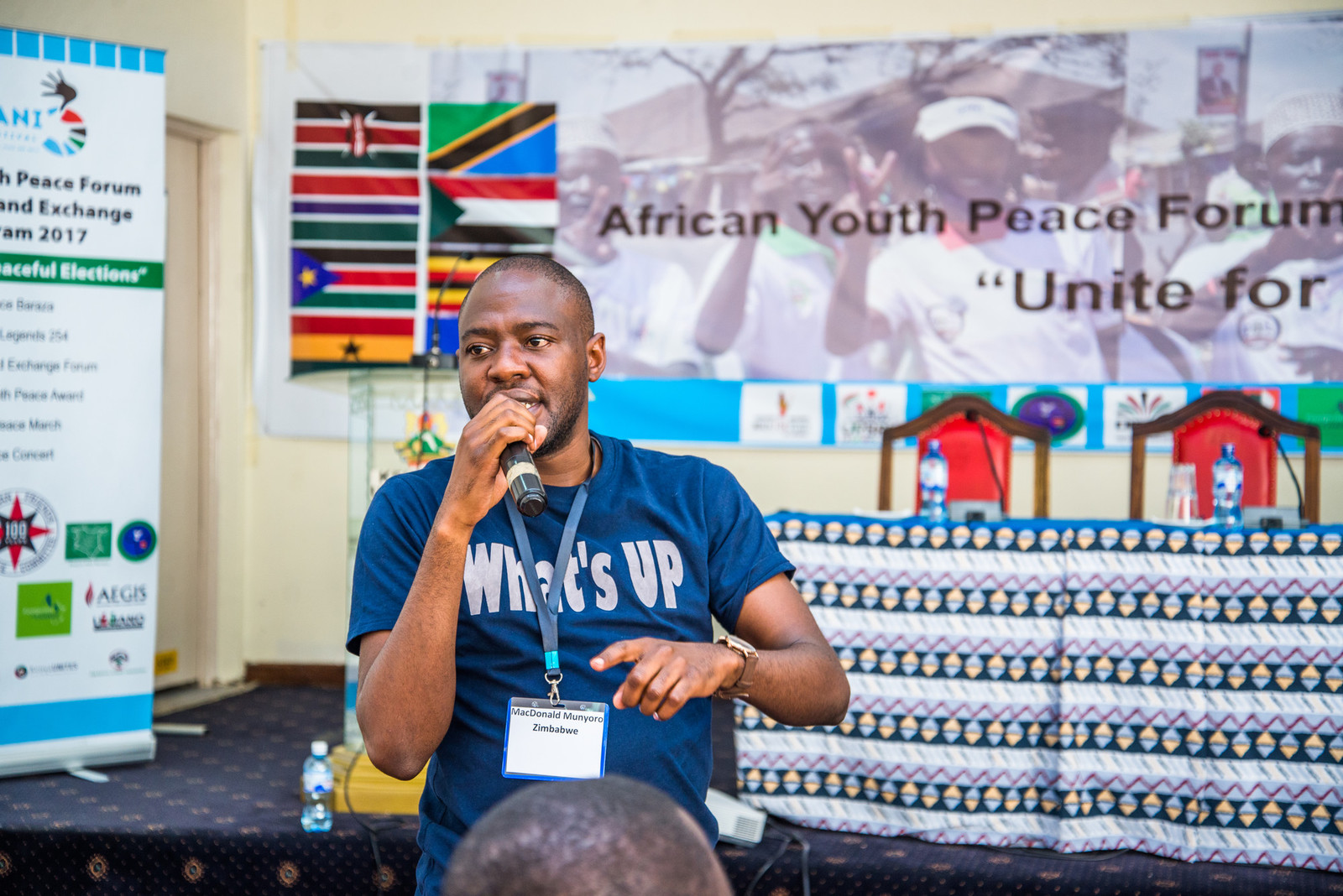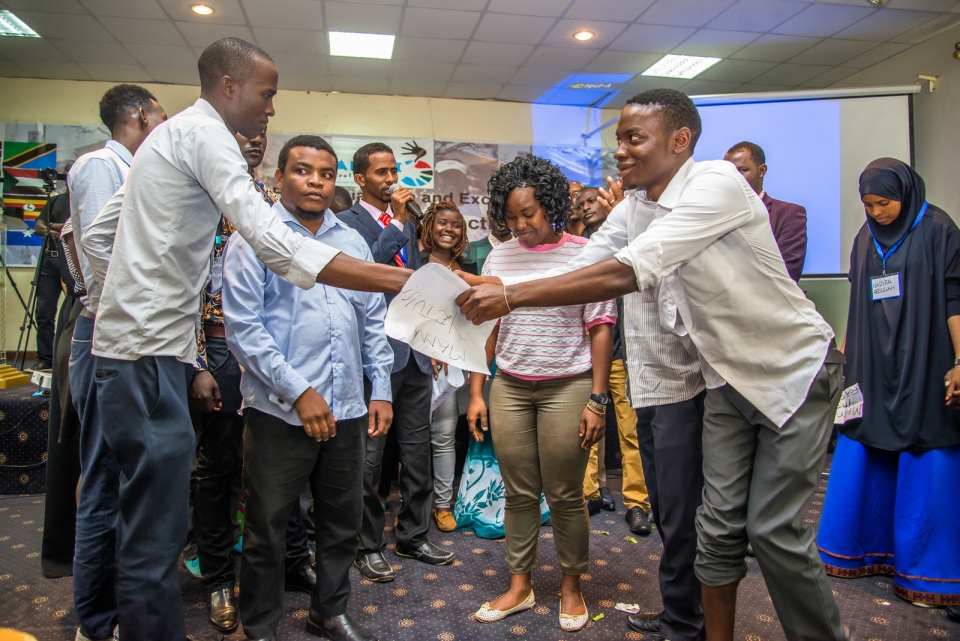
AFSC recently held a Dialogue and Exchange Program in Kenya focused on youth working to prevent and reduce election violence. George Mimano / AFSC
As Kenya prepares for next week's election, AFSC is helping young people call for peaceful elections.
Kenya has had a history of electoral and political violence, but the events that followed the 2007 election were especially horrific. More than 1,300 people were killed, and over 600,000 were displaced in the violence that followed the controversial election and ballot counting process. A country that was a strong and stable democracy in East Africa appeared to be on the precipice of a continued civil conflict.
In the years since, AFSC has contributed to efforts to reduce the possibility of post-election violence. AFSC jointly with other peace building organizations have been supporting post-conflict healing and reconciliation through community dialogues. As Kenya is preparing for another round of elections scheduled to take place next week on Aug. 8, AFSC staff have also been proactive in creating emergency contingency plans to respond if violence does break out.
In many news reports, the 2007/2008 post-election violence in Kenya was largely blamed on the ethnic conflict in the country. However, many of these reports failed to acknowledge that this conflict is deeply rooted in the colonial history of Kenya, which was under British rule from 1895 to 1963.
Kenya’s ethnic and tribal conflict is mostly a product of inequalities in the distribution of land and resources. Agricultural and pastoral land in Kenya has been unequally distributed among ethnic groups because of population control, expulsion, and displacement—practices that were used by the British colonial government to rid certain ethnic groups from parts of the country, creating a land and resource imbalance.
During election season, ethnic tensions get worse because almost all political parties are formed along ethnic lines. Kenya has no pluralist, cross-ethnic party. That’s due in large part to the colonial British government’s “divide and rule,” strategy, constantly pitting one tribe against the another and only allowing political parties to be formed along ethnic lines.

In 2007, these factors were all at play—all while almost two million Kenyan youth were unemployed. Politicians exploited the discontent among young people and mobilized them to violence by offering money and favors. According to a report released by the Kenyan government, over 70 percent of people who engaged in the post-election violence in 2007 were youth.
Today, as Kenya faces renewed fears as it nears this month’s election, AFSC is continuing its ongoing work with communities to prevent and reduce violence. While international efforts focus on providing technical support to the electoral process, AFSC’s programs—both in communities and on the national level—focus on preventing electoral violence by working with young people.
AFSC facilitates Alternatives to Violence training workshops in communities around the country, helping youth develop abilities to resolve conflicts without resorting to manipulation, coercion, or violence. Since 2014, the workshops and training program has reached over 1,500 youth around the country.
After attending a nonviolence training organized by AFSC, a youth from Kibera—one of the areas most affected by the post-election violence in 2007—said the training had taught him the importance of listening. “I did not know that listening was so important” he told AFSC. “If I had acquired more knowledge about it, I would have saved lots of lives by being able to persuade youth not to be involved in violence.”
On a national level, AFSC helps strengthen local peace efforts by coordinating peace actors across Kenya. AFSC partners with organizations like the AVP Trust (Kenya), Friends Church, Friends in Peace and Community Development, and Peace Ambassadors. Together with these organizations, AFSC works to promote a culture of peace by implementing sustainable economic and social development programs.

Additionally, AFSC organizes workshops and conferences where equality, tolerance, human rights, and democratic participation are encouraged. AFSC recently helped coordinate the Kenya Peace Conference, whose theme was “Preventing the Cycles of Political Violence: A Participatory Framework for Sustainable Peace Beyond 2017 Elections.”
One of the recommendations that came out of the conference was a commitment from peace-building organizations and peace builders to encourage youth to use and promote peaceful strategies while raising their concerns. The recommendations also encouraged youth to refuse to be politically manipulated to commit violence and to resist ethnic divisions. These recommendations have helped create an environment that promotes social connection among youth across ethnic lines.
AFSC’s role in facilitating nonviolent action and providing a platform for sustainable peace building both locally and nationally has led to increased awareness around the issues of election violence and increased buy-in among youth around peaceful forms of conflict resolution. People are beginning to adopt the AFSC’s messages of peace. Alex Lokimoi, AFSC program officer in Kenya, says, “Overall there has been a decrease in ethno-political violence and some of the long-standing grievances are being addressed." But there is much more work ahead, he added.
Many of the factors that led to the violence in 2007 have yet to be tackled in a comprehensive manner. Take the land distribution issue, for example. After the election, a National Land Commission was established by the government to address the issue of unequal allocation of land, however land reform has yet to take place. The Truth, Justice and Reconciliation Commission was formed to address past historical injustices. The report was submitted to the leadership and the recommendations are yet to be implemented. The youth unemployment rate remains high. And to add to the challenges facing Kenya, there has been dramatic decrease in international assistance to the country.
On Election Day, AFSC is supporting the Quaker Peace Initiative and the Mennonite Central Committee in election monitoring. Kennedy Akolo, AFSC Africa regional director, says, “Jointly with other peace organizations, AFSC is also exploring support to alternative mediation process in the event the polls are contested.”
Regardless of what happens on Aug. 8, AFSC will continue working with communities in Kenya and is ready to respond to their needs.
Saurav Upadhyay is the International Programs intern at AFSC. He has a Masters in International Peace and Conflict Resolution and is interested in journalism, international development, and peace building.